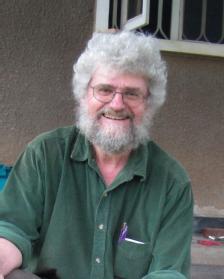Colin Oram
The best part of my job
The job has enormous freedom of time and thought. I can do so much - take in lectures from climate scientists, agricultural engineers, Chinese academics, go to exhibitions and conferences. Fantastic! And I get to meet some pretty amazing people, including remarkably, students.
I can also spend time overseas in development work with students and others. At the moment this work centres on hydro-electricity in rural Uganda - we have installed three schemes so far - serving perhaps 2000 villagers. The work has its frustrations and costs, but rural electricity allows battery charging for mobile phones and radios and the power allows study lighting at night for homework and security lights for female students in boarding schools. Mobile phone communication facilitates fairer pricing of commodity trading (coffee) and political organisation. And the need for long term probity and organisation is moving the communities on in their understanding perhaps by decades.
The students (23 so far) have done so much - endless committee meetings - endless explaining - endless digging, welding and management.
The least favourite part of my job
Exam setting and marking can be pretty tedious. I have been relieved of the marking of 600 answers in a weekend, but there is still the annual challenge of forcing the footers on the papers into the right form!
My most important reasons for wanting to be a teacher
It is fun and it is important.
It is important to get over something of the complexity and unexpected connections between elements of engineering - rarely in text books. A good example is why there were sprung buffers on railway rolling stock until well into the 1960s? The answer is that bearing steel refinement was not good enough until the 1930s to make rolling element bearings which have low starting, as well as low running, friction! So trains had plain bearings which made starting difficult. The fix was to reverse the engine into the train to compress the sprung buffers and get oil circulating in the carriage bearings. Starting forwards was then much easier. (Of course the buffers also took out the worst of the shocks in shunting etc.) Or we could ask why we go red in the face when carrying something heavy or why the front tyres of cars and lorries wear out before the rear…
It is also important to get over the excitement of creativity - engineering is about creating things or services which will probably be important in peoples' lives. It is about "doing for a penny what any fool can do for a pound"! There is a lot here - it really drives us and it is so important that students pick up this excitement.
The best lessons I have learnt from my students
"Why break the habit of a lifetime" - comment from a mature student on my error packed organisational abilities on a field course to Wales many years ago. Just stand back, count to ten and think.
If there is a problem with a modern appliance (computer, data projector etc) get the students to fix it. Takes seconds!
Difficult problems can be solved in conversation with students. Quite often and after suitable thought, let them tell you what to do. Refreshes the parts other thought cannot reach.
Keep going - some students show fortitude very far beyond their years. It has been a privilege to know them.
Pearls of wisdom from my colleagues
Are you sure? Did you check? Some gentle reminders to think! It is so easy to to jump to erroneous conclusions. Only set work that you can mark!

Colin Oram, School of
Engineering
WATE winner 2012
Colin’s teaching combines formal and informal approaches, providing a rich, innovative and stimulating learning experience to his students. His support of on-going projects to build small hydro-electric plants in rural Uganda is aligned with enhancing the international engagement of a small group of students each year.
